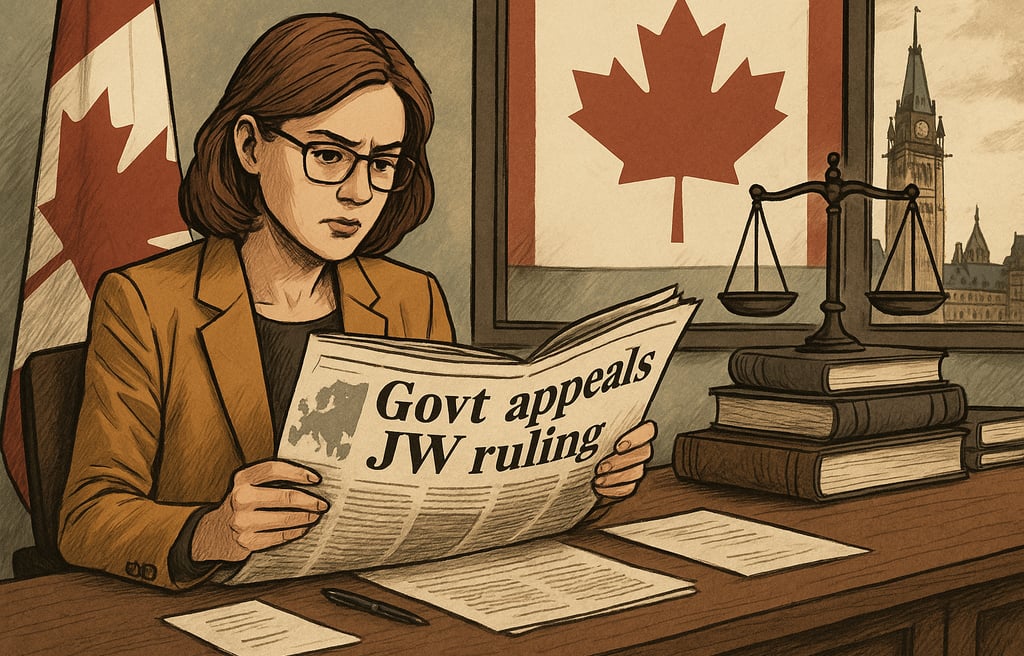When Freedom Harms: What Canada Can Learn from Norway’s Stand Against Religious Shunning
What happens when the right to religious freedom clashes with the right to family, identity, and mental health? (This post is cross-published on Totally Awake and Unboxed Thinking.)
FEATURED ON HOMEPAGETTATT
Oliver
4/24/20253 min read


In 2022, Norway stripped the Jehovah’s Witnesses of their legal religious status — not because of what they believe, but because of how they treat those who leave. The decision followed public outcry over practices like shunning, the expulsion of minors, and internal judicial policies with little external oversight.
Fast forward to 2025: Norway’s government has just announced it will appeal the case to the Supreme Court after a lower court ruled in favour of the Watchtower organization (source). The stakes couldn’t be higher — and Canada should be paying attention. Because the harm is already happening here. Families are being split, teens are being shunned, and psychological damage is being inflicted — all under the guise of "letting religion do its thing." If we don’t update our legal frameworks, we’re not just enabling harm — we’re ignoring it.
A Timeline Canada Should Watch
On my blog Totally Awake, I’ve documented the broader context around Norway’s case against the Jehovah’s Witnesses here. The case hinges on very real practices:
Shunning of ex-members, including family
Disfellowshipping minors, sometimes as young as 13
A closed internal judicial system that disciplines members in secrecy, with little recourse
These aren’t just theological quirks. They have devastating social and psychological effects. The Norwegian government recognized this. Will Canada?
Why This Should Sound the Alarm in Canada
Jehovah’s Witnesses in Canada maintain charitable status, tax exemptions, and institutional protections. Yet they enforce a system where questioning doctrine can lead to total social exile. Families are torn apart. Teenagers are expelled from their communities.
This isn’t just religious practice. It’s coercion. It’s emotional control. And it’s being subsidized by Canadian taxpayers.
A Legal Grey Zone
The Watchtower organization has recently begun rebranding disfellowshipping as "removal" — a softer term for the same harsh consequence. This shift in vocabulary doesn’t change the impact: shunning still severs family ties, isolates individuals, and punishes independent thought. But the new language helps deflect public scrutiny and soften the perception of harm. Canada has few mechanisms to:
Revoke religious or charitable status for coercive internal policies
Recognize psychological abuse through enforced shunning
Protect minors from spiritually framed punishment and social exclusion
An Opportunity in Plain Sight: The CRA Debate
In early 2025, Canadian Affairs and other domestic outlets reported on a proposal before Canada’s Standing Committee on Finance that would remove "advancement of religion" as a stand-alone charitable purpose. The recommendation was originally included in the Committee’s December 2024 report, which featured over 460 proposed changes. Churches and religious leaders across Canada have since expressed alarm, warning of destabilization to the charitable sector. (Canadian Affairs, January 2025)
But what if this legislative moment could be used to rethink which religious groups deserve public subsidies?
If religious groups want public money, they should also meet public standards — especially when it comes to respecting human rights. We can support freedom of belief without funding psychological abuse.
A Canadian Action Plan Inspired by Norway
Here’s what lawmakers, journalists, and citizens can do:
Modernize CRA oversight: Review the charitable status of groups whose internal practices include coercive control or emotional exile.
Recognize shunning as psychological harm: Especially when it targets minors or is used as a form of social punishment for dissent.
Strengthen protections for youth: Ensure that expelling baptized teens or pressuring minors into high-control environments is flagged by child protection services.
Support media and survivor advocacy: Encourage coverage of high-control religious practices, and amplify the voices of those affected.
Conclusion In Canada, religious freedom is constitutionally protected — and rightly so. But no freedom is absolute. When belief becomes a shield for abuse, it’s time to draw a line.
Norway has. Canada should.
How You Can Help
Share this post with your MP or local representative (sharable PDF available here)
Send it to journalists covering religion, rights, or mental health
Start or sign a petition urging CRA to review tax-exempt religious groups with harmful practices
Further Reading and Sources on the Norway Case:
Totally Awake – Can Truth Be Found? (Timeline and Background)
https://avoidjw.org/news/court-gave-strongest-benefit-of-the-doubt/
This post is cross-published on Totally Awake and Unboxed Thinking.
Federal Email Template (for MPs, Ministers, Party Leaders)
Subject: Urgent Need for Oversight on Religious Charitable Status in Light of Human Rights Concerns
Dear [MP Name],
I’m writing to you as a concerned citizen regarding the urgent need to review Canada’s policies around charitable status for religious organizations that engage in harmful social practices.
Recent events in Norway, where the government revoked the legal religious status of Jehovah’s Witnesses due to practices of shunning and exclusion, highlight how countries can act when individual rights are harmed in the name of religion. A public briefing on this issue is attached:
📄 Canada_Norway_Tax_Reform_Briefing.pdf
In Canada, similar practices continue unchecked under the protection of charitable status and religious freedom. Families are fractured, teenagers are expelled from communities, and emotional control is exerted under the guise of faith.
I respectfully ask you to:
Support modernization of CRA oversight for religious charities
Recognize shunning as a form of psychological harm
Protect minors from institutionalized social exclusion
Amplify survivor-led calls for reform
Thank you for your service and attention to this important issue.
Sincerely,
[Your Full Name]
[City, Province]
[Optional: Phone or Email]
